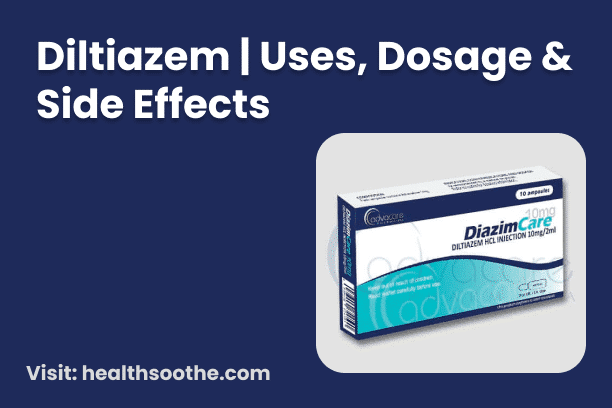Diltiazem is prescribed to prevent angina, a condition causing chest pain. It can enhance your exercise capacity and reduce the frequency of angina attacks. Diltiazem falls under the category of calcium channel blockers.
Its mechanism involves relaxing blood vessels in both the body and heart, thus decreasing heart rate. This eases blood flow and reduces the strain on the heart.
Guidelines for using diltiazem orally:
Administer this medication by mouth before meals and before bedtime, adhering to your doctor’s instructions, which usually entails taking it 3 to 4 times daily.
The appropriate dosage is determined by your medical condition, how you respond to treatment, and any other medications you may be using. Ensure you inform your doctor and pharmacist about all products you use, including prescriptions, over-the-counter drugs, and herbal supplements. Your doctor may gradually adjust your dose; it’s important to follow their instructions closely.
To achieve maximum benefits from this medication, use it consistently. To aid in remembering, take it at the same time each day. This medication needs to be taken on a regular basis to prevent angina; it is not intended to treat angina during an attack.
In such instances, follow your doctor’s instructions for using other medications like sublingual nitroglycerin to relieve an angina attack. For specific details, consult your doctor or pharmacist.
How long does Diltiazem stay in your system?
The duration that Diltiazem remains in your system can vary depending on factors such as your individual metabolism, dosage, and how long you have been taking the medication. However, Diltiazem has an elimination half-life of about 3 to 4.5 hours. This means that it takes approximately 3 to 4.5 hours for half of the drug to be eliminated from your system.
In general, it takes about 5.5 half-lives for a medication to be mostly cleared from your body. So, for Diltiazem, it might take around 16.5 to 22.5 hours for the drug to be mostly eliminated from your system after you stop taking it.
It’s important to note that even though the drug might be mostly eliminated from your body, its effects could still linger due to residual activity or interactions with other substances. Always follow your healthcare provider’s guidance and recommendations regarding medication usage. If you have concerns about the duration of Diltiazem in your system, it’s best to consult your doctor or pharmacist for personalized information based on your situation.
Side Effects
You may experience dizziness, lightheadedness, weakness, nausea, flushing, constipation, and headache while using this medication. If any of these effects persist or worsen, it’s important to promptly inform your doctor or pharmacist.
To minimize the risk of dizziness and lightheadedness, take care when transitioning from a seated or lying position to standing up gradually.
Keep in mind that your doctor has prescribed this medication because they have determined that the benefits outweigh the potential side effects. Many individuals who use this medication do not experience serious side effects.
If you encounter severe side effects, such as persistent nausea or vomiting, fainting, worsening heart failure symptoms (such as breathlessness, swollen ankles/feet, unusual fatigue, rapid weight gain), irregular or rapid heartbeat, changes in mental state (like depression or agitation), vivid dreams, intense abdominal pain, dark urine, or yellowing of the skin or eyes, seek medical attention promptly.
Although it’s rare, a severe allergic reaction to this drug may occur. If you notice any symptoms of a serious allergic reaction, such as a rash, swelling or itching (especially in the face, tongue, or throat), intense dizziness, or difficulty breathing, seek immediate medical assistance.
Precautions
Before starting diltiazem, inform your doctor or pharmacist about any allergies you may have to this medication or other substances. Inactive ingredients in the product could potentially trigger allergic reactions or other complications. Consult your pharmacist for further information.
Prior to using this medication, disclose your medical history to your doctor or pharmacist, especially if you have specific types of heart rhythm disorders (such as sick sinus syndrome or atrioventricular block), liver disease, kidney disease, or heart failure.
This drug has the potential to induce dizziness. The consumption of alcohol or marijuana (cannabis) can intensify this dizziness. Therefore, avoid activities requiring alertness, such as driving or using machinery, until you can do so safely. It is advisable to limit alcohol intake. If you are using marijuana, discuss this with your doctor.
If you are planning to undergo surgery, inform your doctor or dentist about all the medications you are taking, including prescription drugs, over-the-counter medications, and herbal products.
Older adults may experience increased sensitivity to the side effects of this drug, particularly dizziness, constipation, or swelling in the ankles and feet.
During pregnancy, use this medication only if it is clearly necessary and beneficial. Have a discussion with your doctor about the potential risks and advantages.
This drug is excreted in breast milk and may lead to unfavourable effects in a nursing baby. Consult your doctor before breastfeeding.
Interactions
Interactions between drugs can influence how medications function or elevate the potential for severe side effects. This document does not encompass all feasible drug interactions. It is important to maintain a record of all the products you are using, including prescription and non-prescription drugs as well as herbal products, and share this list with your doctor and pharmacist. Do not initiate, cease, or modify the dosage of any medications without the consent of your doctor.
Certain products may interact with this medication, such as digoxin and fingolimod.
Various medications can affect the elimination of diltiazem from your system, which could impact the efficacy of this medication. Examples of these medications include azole antifungals like ketoconazole, cimetidine, macrolide antibiotics such as erythromycin, rifamycins like rifabutin and rifampin, and St. John’s wort, among others.
This medication has the potential to slow down the elimination of other drugs from your system, which may alter their functioning. Examples of affected drugs include aprepitant/fosaprepitant, asunaprevir, buspirone, colchicine, elacestrant, flibanserin, ivabradine, lomitapide, certain benzodiazepines like triazolam and midazolam, among others.
Certain products may contain components that could elevate your heart rate or exacerbate chest pain. Inform your pharmacist about the products you are using and inquire about their safe use, particularly in the case of cough-and-cold products, diet aids, or NSAIDs like ibuprofen/naproxen.
Overdose
Missed Dosage:
If you forget a dose, take it as soon as you recall. If it’s close to the time for your next dose, skip the missed one. Take your next dose at the scheduled time. Avoid doubling the dose to compensate for the missed one.
Storage:
Keep this medication at room temperature, shielded from light and moisture. Avoid storing it in the bathroom. Ensure that all medications are inaccessible to children and pets.
Do not dispose of medications by flushing them down the toilet or pouring them into drains unless specifically advised to do so. Properly discard this product when it reaches its expiration date or is no longer required. For disposal guidance, consult your pharmacist or local waste disposal facility.








